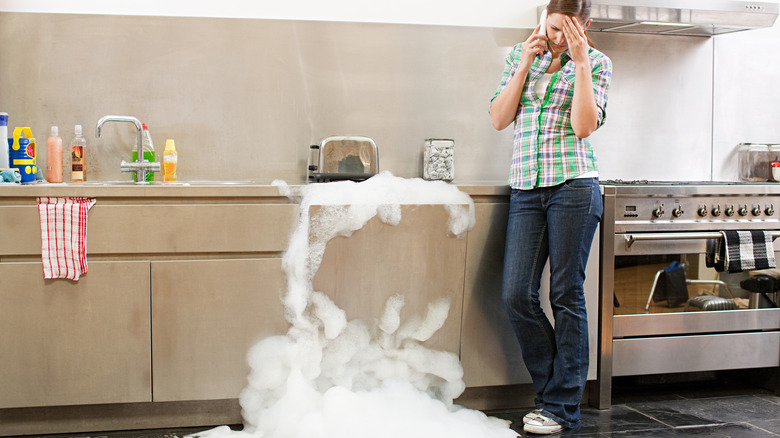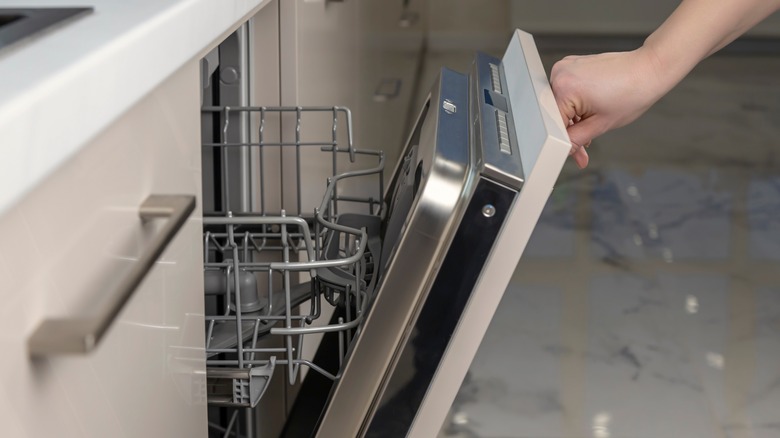5 Key Signs Your Dishwasher Is About To Break
It can be a challenge to find the right dishwasher, but even when you settle on one you want, it can still break down over time. Much like a washing machine or other major appliance.
The thing is, it can sometimes be difficult to figure out if your dishwasher's quirks are the result of a major problem or a minor annoyance. It can also be tough to know if it's something that can be fixed or not without calling in a professional, which can run up a bit of a bill even before accounting for dishwasher repair or replacement.
Some situations, like a machine that's over a decade old or the desire to upgrade an old model to something more energy efficient, lean far more towards replacement. However, not every odd sound or unexpected puddle is a sure sign of severe damage or busted internals. The trick is knowing what to look for and what it might mean.
What to look out for
There are a plethora of ways for your dishwasher to tell you something's wrong (though severity differs). Not all problems require full-on replacement, and not all situations requiring a new dishwasher are obvious, but here's a handful of the more common signs:
- If the door won't latch or stay closed, it's possibly caused by a busted latch, improperly loaded dishes, racks not being pushed in all the way, or the door warping over time.
- Dirty dishes or glasses after finishing a wash cycle might be a dirty filter or clogged spray arm, or possibly hard water (high in calcium).
- Pooling water inside or outside the dishwasher could be due to a clogged drain, blockage from a connected garbage disposal line, or problems with the drain pump.
- Cold dishes after washing means something is wrong with the heater, which may have accidentally come unplugged or could be outright broken.
- Signs of physical damage like cracks or rusting either inside or out can be caused by regular wear and tear or loading the wrong items. Rust is possibly from a water leak (outside) or the interior of the machine wearing away (inside).
Whether or not your dishwasher woes necessitate calling in a professional or buying an entirely new unit depends on which of the above maladies you're having. Though some of them could go either way depending on the severity.
Repair or replace?
Obvious damage (cracks, rust, etc) should be considered full-on replacement territory, because it's a sign of the machine physically breaking down. Do not — under any circumstances — ignore rust on the inside of the machine, as continuing to use it while rusted will result in that rust getting all over your dishes and potentially into your digestive system.
The same goes for opening the dishwasher right after a cycle and finding cold dishes, which are most likely caused by a problem with the internal heater. There's a chance it might just be a connection that was knocked loose, but if the heater itself is busted, it's better (and usually more cost-effective) to replace the whole machine. You absolutely do not want to ignore cold dishes, for sanitary reasons.
A door that won't latch, dishes that aren't fully cleaned, or puddles of water could end up requiring a full replacement, but there are other potentially fixable causes. If the door doesn't stay closed it may be a simple matter of a latch repair or swap, however if the door itself is warped it's time to start shopping around. Dishes that are dirty after a washing could just be the result of a dirty filter or clogged spray nozzles — all of which you can clean yourself. And as scary as puddles can be, the cause might be as basic as a clogged drain. Though, if the puddles persist after removing the clog, your problems are likely big enough to warrant a full replacement.


